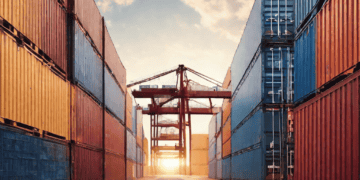In recent times, the integration of blockchain technology within the logistics sector has emerged as a transformative force, promising significant advantages for companies operating in this industry. This innovation has the potential to reshape traditional practices, fostering enhanced competitiveness and profitability across the sector. The implementation of blockchain addresses longstanding trust-related issues by providing a system that operates without intermediaries, thereby streamlining processes, mitigating risks, and fostering transparency and trust among involved parties. As a result, this technology stands to drive cost efficiencies by accelerating processes while ensuring the security and transparency of transactions.
Unlocking the Potential of Blockchain in Cost Reduction and Revenue Increase:
The potential impact of blockchain technology on reducing operational costs and fostering revenue growth is substantial. Research from the World Economic Forum indicates that diminishing supply chain trade barriers could amplify global gross domestic product by nearly 5% and bolster global trade by 15%. Blockchain’s integration in logistics operations is poised to deliver notable advantages, such as an estimated 85% reduction in documentation costs and a decreased risk of loss, theft, or damage associated with vital documents like bills of lading. Furthermore, the technology introduces new functionalities, potentially leading to a surge in new customer acquisition by up to 400% and a remarkable upswing in customer spending by as much as 1200%.
Barriers to Adoption:
Despite the significant advantages that blockchain technology offers, many companies grapple with the decision to adopt and implement it. Challenges include a lack of clarity regarding the appropriate approach to developing blockchain solutions. While acknowledging its potential to reduce operational costs, companies are wary of the substantial changes required in established processes, which may generate additional costs and risks.
Governance issues and concerns about disrupting existing operations deter companies from embracing blockchain solutions. Additionally, inadequate understanding of where blockchain technology can be optimally utilized may lead to its implementation in areas with limited benefits, inadvertently creating further complexities.
Moreover, the evolving nature of blockchain necessitates a proficient technical team, posing a potential obstacle for smaller firms unable to accommodate such costs. For many businesses, creating a blockchain solution from scratch might not be the most viable option, prompting the search for existing solutions that can streamline the adoption process while meeting their specific requirements in a more controlled environment.
Impact of Blockchain on Logistics Operations:
Blockchain technology stands as a pivotal innovation trend in the logistics domain, presenting distinct advantages across three crucial facets of supply chain management: traceability, tracking, and smart contracts.
Traceability: The complexity inherent in supply chains involving multiple stakeholders finds simplification and enhanced transparency through blockchain technology.
Tracking: Real-time tracking at all stages of transportation stands out as one of the most advantageous applications of blockchain within logistics.
Smart Contracts: By enabling reliable transactions without necessitating third-party validations, smart contracts significantly reduce processing costs.
Major logistics players like DHL, FedEx, UPS, and Maersk, along with corporations in industries such as Consumer Packaged Goods (CPG), Food & Beverage (F&B), automotive, healthcare & life sciences, among others, have made substantial investments in blockchain to bolster trust, transparency, and manage complex supply chains.
Commercial Solutions in Crucial Areas for Logistics Operations:
Blockchain for Traceability: NeuroChain, a French company combining blockchain with machine learning, offers a platform designed for traceability. Their NeuroChain Tracer ensures comprehensive asset visibility for stakeholders through smart contracts, asset management, reliable data, and enhanced security.
Blockchain for Tracking: CargoX, a Slovenian startup, specializes in a blockchain-based solution for containerized ocean freight. Their electronically issued Bill of Lading solution reduces document transfer time to mere minutes, virtually eliminating the risk of loss, theft, or damage associated with traditional paper documents.
Blockchain for Smart Contracts: dexFreight, focused on optimizing road transport efficiency in the United States, employs hybrid cloud and blockchain architecture to manage contracts between involved parties. Their use of smart contracts has led to a substantial increase in new carriers and truckload freight spend.
Looking Ahead:
Beyond enhancing process efficiency and reducing costs, blockchain technology paves the way for exploring new services and solutions within logistics. While most companies recognize its potential for efficiency gains and cost reduction, there remains untapped potential in developing new value-added solutions. The realization of this potential depends on adapting to new governance and business models, fostering collaboration between companies, and exploring large platform-based protocols.
The future holds additional opportunities for logistics companies in areas such as increased energy savings, heightened security, simplified regulatory compliance, and identifying new consumer habits. The continuous evolution of blockchain promises a landscape of innovative possibilities for the logistics industry.
By embracing blockchain technology and leveraging its inherent capabilities, logistics companies can position themselves at the forefront of innovation, thereby reshaping traditional practices and reaping substantial benefits across their operations.
Your source for supply chain logistics news updates: The Supply Chain Report. Enhance your international trade knowledge at ADAMftd.com.
#BlockchainInLogistics #LogisticsTech #SupplyChainInnovation #BlockchainForBusiness #DigitalSupplyChains #SmartContracts #Traceability #SupplyChainTracking #TechForEfficiency #FutureOfLogistics















